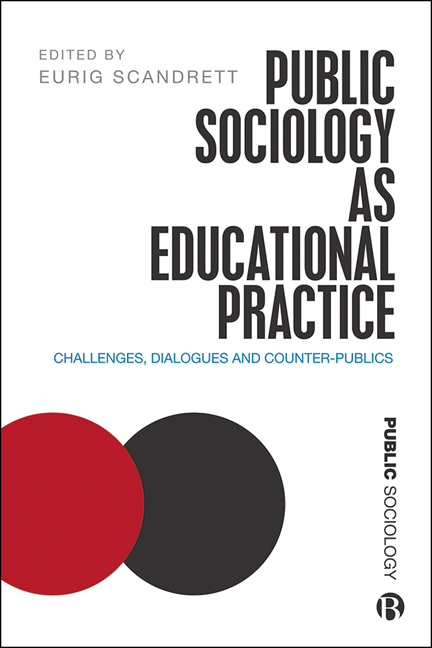II.0 - Provocation II: ‘Really Useful’ Public Sociology Knowledge
Published online by Cambridge University Press: 02 March 2021
Summary
This section addresses the ‘what’ of public sociology education, and asks about the political and epistemological status of public sociology knowledge, including in relation to other sociological practices. What special knowledge(s) can public sociology generate? And, in particular, what constitutes the knowledge-content, or curriculum, of public sociology education? Here it is argued that a key heuristic for public sociology knowledge is its requirement to be ‘really useful’ in the sense that this term has developed in adult education theory (Johnson, 1976; Scandrett et al, 2010).
The concept of ‘really useful knowledge’ has been used in radical adult education theory to mean knowledge that is selected, critiqued and generated by communities and groups engaged in struggles against oppression. It is based on the nineteenth century British working class critique, as elaborated in the radical press of the time, of the philanthropic Society for the Diffusion of Useful Knowledge (SDUK), established in 1826 by the Edinburgh lawyer and Whig politician Lord Henry Brougham. Brougham argued, contrary to the explicit elitism of the Tories of the time, that it was important for Enlightenment knowledge in the sciences and humanities to be made available to the working class through public lectures. Following the same tradition of public education delivered by the Andersonian Institution and the Mechanics Institutes, the SDUK was based on a philosophy that knowledge held by the elite should be translated into forms that could be accessed by the working class – at least its skilled sectors.
These institutions by the educated elite for the benefit of the working class were subject to radical critique as
organs of the middle classes [teaching students] to be subservient to the existing political and social order. All that the worker hears in these schools is one long sermon on respectful and passive obedience in the station of life to which he has been called. (Engels, 1844)
At the time of SDUK, radical working class political movements such as the Chartists and the Owenites were arguing that the working class should be in control of their own education. Mocking the SDUK, the movement for ‘Really Useful Knowledge’ questioned in what way this knowledge was useful: useful for whom? who is to decide its usefulness?
- Type
- Chapter
- Information
- Public Sociology as Educational PracticeChallenges, Dialogues and Counter-Publics, pp. 111 - 120Publisher: Bristol University PressPrint publication year: 2020



